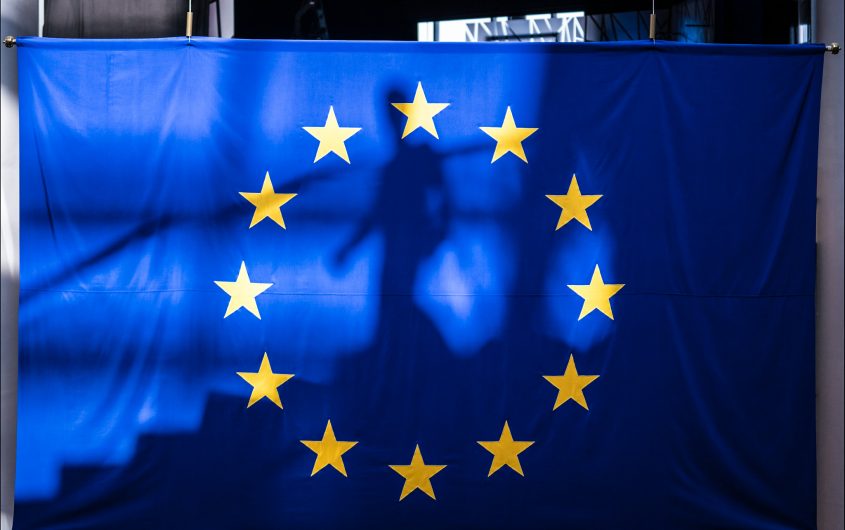
European Parliament via Flickr
How Will the EU Survive the Coronavirus?

Irene Kyriakopoulos
National Defense University
Dr. Irene Kyriakopoulos is Distinguished Professor of National Security Policy, ICAF, National Defense University, and Public Policy Scholar at the Wilson Center. Her current research focuses on the European debt crisis, building on earlier work on European economic integration ("After expansion: Europe in disunion?" Mediterranean Quarterly, Winter 2004; and Trouble in Paradise? Europe in the 21st Century, with Steven P. Kramer, NDU Press, 1996). She holds a B.S. degree in economics from the University of Maryland, and Master’s and PhD degrees, also in economics, from The George Washington University.

Steven Kramer
National Defense University
Dr. Steven P. Kramer is Professor of National Security Studies, Eisenhower School, National Defense University. He was a fellow at AICGS in the early 1990s.
What will be the effects of the coronavirus pandemic on Europe? How will the pandemic change the trajectory of European development? One way to answer these questions is to ask where Europe seemed to be headed before the coronavirus struck and then assess what is likely to change as a result of the pandemic. We will address these questions based on an analysis of European trends we prepared for the Institute for National Security Studies at National Defense University, just before the onset of the pandemic, and which projected European futures five years out. The goal of that paper was to analyze Europe from the perspective of a world increasingly defined by great power competition. We’ll summarize our findings and then consider how the coronavirus is likely to affect them.
Resilient but Troubled
Our basic theme was that Europe was resilient but troubled. When European integration began with the Schuman Plan in 1950, it was a superb strategy for transcending generations of conflict and creating a new union. When the Cold War ended, the European Union (EU) dared to expand toward the very limits of the continent. Operating in a moment of dominant U.S. power and the absence of great power rivalry, Europeans thought large and operated boldly. That dynamism seemed to have been lost.
Although Europe’s share of global economic output is comparable to that of the United States, the EU is not a great power, never realizing the forecasts of some that it would become a superpower in the post-Cold War world. Instead, the European integration experience has been one of challenges. Europe showed considerable resilience while overcoming the 2008 Great Recession and saving the euro in the face of a serious sovereign debt crisis. The EU’s cohesion and solidarity were also severely tested by terrorism, uncontrolled migration, and Brexit. These problems generated extremist populist movements across the continent, which challenged liberal democracy and inhibited cohesive EU policy positions or security activities. The Franco-German partnership, which had been the locomotive of European integration, seemed to have run out of steam. Europe faced a more aggressive Russia, growing Chinese economic and political power and a lack of trust in the U.S. commitment to the transatlantic union and European common defense. Despite its enormous latent power potential, Europe had become an object of great power rivalry on the continent rather than a competitor itself. Europe’s responses to its ongoing and potential future challenges would shape its role in the new era of Great Power competition.
How the Coronavirus Has Affected the EU
How have the EU’s problems been affected by the coronavirus? And what other new problems have arisen with the advent of the pandemic?
The current crisis is truly existential by its very nature, as it involves a highly contagious disease about which little is known, but which has already caused a lot of death, fear of survival, unprecedented economic damage, and uncertainty about the return of normality. This crisis is thus much more overwhelming than the Great Recession. The pandemic has been compared to World War II for its devastating effects on humanity. The corona virus is a new, invisible enemy; the damage it does to Europe’s economy and society will define the collective mentality and shape how Europeans plan for a future recovery. Before fully recuperating from the financial crisis of the last decade, the EU faces the prospect of 8 percent fall in GDP and an unemployment rate of 10 percent in 2020, according to estimates of the European Commission. The pandemic will test the resilience of Europe’s economy as no other crisis before.
The corona virus crisis has strengthened trends towards renationalization in the EU.
National governments were the first responders to the crisis; one of their first reactions was to close their borders as opposed to reaching out to help. Already damaged by the migration crisis, Schengen has been broken by the pandemic, depriving member states of the legendary benefits of the single market. There is a widespread recognition of the need to rebuild continental independence in vital sectors like health. But will that independence be construed in European or national terms?
The EU has made little contribution to solving the pandemic crisis; it has hardly been present.
The pandemic has exposed structural weaknesses in EU governance, which lacks institutions for disease prevention and management at a pan-European level. The EU’s Directorate-General for Health and Food Safety has a limited competency; member states assume the primary role in matters of public health and can only rely on their own resources. Faced with a pan-European health emergency, continental Europeans relied on their national authorities for solutions. As with the migration crisis, the organs of the EU did not advance concrete policy responses or resources to mitigate the effects of the pandemic. The EU’s inability to provide timely solutions will reinforce the feelings of continental Europeans that only their governments, not the EU, can offer help during times of urgent need—which could strengthen Euroscepticism. An early test of the need to develop common policies is the preparation for safe travel during the summer 2020 tourist season. With tourism accounting for 10 percent of Europe’s economy, the EU is still without a Schengen-wide travel protocol. In this as in other respects, Europe is moving away from, not closer to, an ever-closer union.
The pandemic has exacerbated earlier tensions between national and EU institutions.
Significantly, the jurisdiction of the ECB, which was the main actor in the management of the debt crisis, has been open to challenge. During the financial crisis, the ECB had vowed to do “whatever it takes” to save the euro and pursued expansive quantitative easing to that end. The ECB’s interventions were frowned upon by Germany and other northern European countries back then. Similarly today, as the ECB is devising policy in response to a devastating recession in the Eurozone, more tension is brewing. On May 5, 2020, Germany’s Constitutional Court ruled that the Bundesbank might not continue to participate in the ECB’s asset purchase program without proper justification; for now, the German court’s ruling rejects the validity of EU law on grounds that it challenges national sovereignty and budgetary autonomy.
The crisis has reignited North-South tensions that date back to 2008.
These tensions are likely to increase as the economic and financial cost of the crisis keep rising. As happened with proposals to mutualize the debt of states on the verge of default a decade earlier, appeals by southern EU member states in favor of “coronabonds” in the face of the pandemic were ruled out by northern members, notably Germany. This time, it was the divide in health resources that exacerbated the disadvantages of the South, which has to shoulder rising costs on top of fiscal imbalances caused by ten years of austerity. At the same time, the coronavirus crisis has enabled leaders in Hungary and Poland to move further toward autocracy. In a unique example, Prime Minister Orban can now rule by decree on grounds that the pandemic equates to emergency.
So far, right-wing populist movements have not benefited from the crisis.
Public opinion has tended to support governments in power. Even governments that appeared shaky before the crisis have been reinforced. Chancellor Merkel, who had been weakened by the migration crisis, speaks about the coronavirus with the gravitas of a scientist; Germany has been well prepared with tests, equipment, and supplies. Italy’ Prime Minister Conte, who once appeared a weak and accidental premier, enjoys high popular support. Their respective opponents, the AFD and Liga, have lost steam. There seem to be tentative signs of a revival of social democracy in France and Germany, probably because such parties are identified with the welfare state. Unlike Americans, Europeans enjoy strong social protections and good health care. In response to the pandemic, European governments have increased their support of businesses to sustain employment. Any relaxation of the non-state aid rule will favor rich countries, like Germany and France, which can subsidize damaged industries. But less affluent countries will be at a great disadvantage, especially if the pandemic drags on and results in an economic and financial debacle worse than the Great Recession.
The corona crisis is likely to act as a damper to migration as Europe ceases to provide employment opportunities and as borders are locked down.
But in the long term, migration pressures may increase again if the virus dislocates Third World societies. The EU’s border protection agency, Frontex, is preparing for new waves of refugee and migrant flows. But if Europe’s recent experience is a guide, popular resistance to unauthorized migration and its financial implications will grow even stronger. The EU’s budget will be under tremendous pressure to increase aid to those states worst affected by the pandemic; a Franco-German plan in the works would allocate resources to mitigate the effects of the pandemic through the EU multi-annual framework. In such a climate, funding resources for migration will be politically unsustainable.
Paradoxically, if the coronavirus has weakened the cohesion of the EU in terms of intra-European relations, it has made it even more important in terms of global relations.
Europe is more alone than it was a decade ago. If China was seen as both a partner and competitor before, it may now inspire fear and suspicion. The coronavirus crisis will raise new questions about the dangers of globalization, especially in terms of the location of supply chains that include research and manufacturing of pharmaceuticals and medical supplies. The pandemic will affect global financial and trade patterns and interdependencies among the great powers, accelerating trends already under way. For the EU, this means that China’s role as a competitor or rival may receive greater scrutiny in future projects involving foreign direct investment in Europe. But for many member states, the lure of the Belt and Road Initiative can become the only antidote to joblessness and protracted recession.
Russia seems more and more alien to European values.
But the EU will be preoccupied with its own survival before reconsidering its positions on Russia’s annexation of Crimea and relationships with Ukraine. Russia’s energy interdependencies with Europe are a constant, unlikely to be affected by the pandemic. And Russia’s finances remain intertwined with the economic fate of its near-abroad as well as with the global economy. A Europe that is increasingly alone and that can no longer count on the transatlantic alliance for its security can ill-afford to alienate any great power.
If Europe had doubts about the directions taken by its major transatlantic partner, those doubts about the U.S. have only increased.
America no longer seems to share the common ideals of multilateralism and global cooperation. Although Europe has not always appreciated the directions taken by U.S. leadership, it is now confused by the refusal on the part of its old ally to play any leadership role in this crisis. None of this seems directly related the future of transatlantic security relations, yet it is very much related: it signifies Europe’s loss of trust in the U.S. Will the U.S. stand up for its allies in a political-military crisis if it does not cooperate with them over a pandemic? Even worse, Europeans may now perceive the American response to coronavirus to reflect a society that is unprepared, unprotected, and dysfunctional. For the first time in the postwar period, Europeans may be feeling sorry for Americans rather than envy.
Determination to Show Resilience
The coronavirus crisis has thus exacerbated many of the problems already faced by Europe before its outbreak. The international climate has become more troubled, tensions in the EU have worsened between North and South and East and West, and the cost of supporting populations at a time of economic crisis caused by the coronavirus is mounting. If before the crisis, the EU was resilient but troubled, its troubles have increased and it will have to prove even more resilient to survive.
Evidence that Europe is still determined to show resilience in the face of the corona crisis comes from the joint Merkel-Macron declaration of May 18, 2020, proposing that the EU borrow €500 billion for a common recovery fund. This proposal, if adopted, would cut the Gordian knot; richer northern members would demonstrate solidarity with poorer southern states, something they roundly declined to do during the debt crisis. The declaration demonstrated that Merkel feels her domestic position is once again strong enough to take a stance that could be controversial in Germany. It also signaled a revival of the Franco-German partnership which historically had initiated major EU advances but had been inactive for many years.
The response of other EU states will test whether France and Germany can still play the decisive role they played under Kohl and Mitterrand in shaping new directions for the EU. But the Franco-German proposal could do more than that, even as a temporary fix. As some observers have noted, it would represent a “Hamiltonian moment,” which might determine whether movement toward an ever-closer union can resume.
Under the best of circumstances, all member states of the EU and their parliaments would have to agree to the proposal. Yet, on May 23, 2020, the “frugal four”—Austria, Sweden, Denmark, and the Netherlands—expressed their objection to financing Europe’s coronavirus recovery with grants through the EU budget; they favor, instead, cheap loans with conditionality attached. As in the past, several states remain opposed to debt mutualization as well as to higher EU budgets. Whether a compromise can be reached by combining grants and loans on favorable terms to the hardest hit member states remains to be seen.
The longer the pandemic rages, the greater will be the pressures for joint action for the survival of the EU—and to avert the dangers of refusing solidarity.
The views expressed in this paper are those of the authors and are not an official policy or position of the National Defense University, the Department of Defense, or the U.S. Government.







